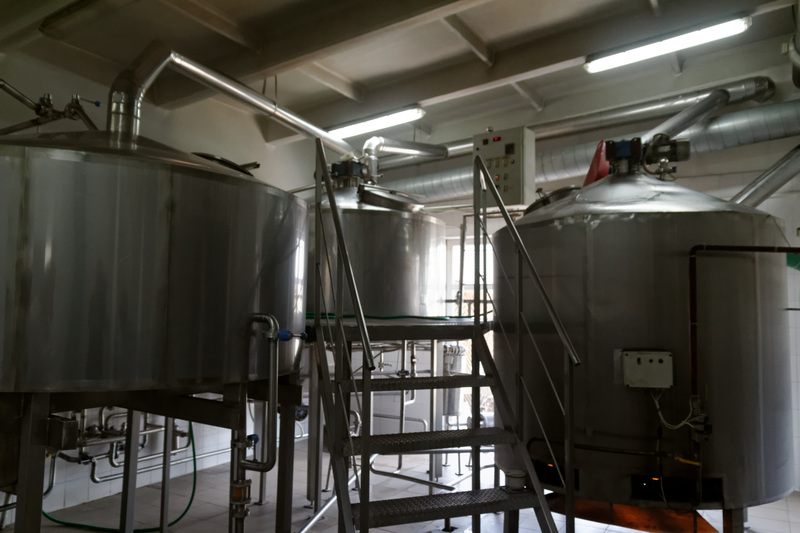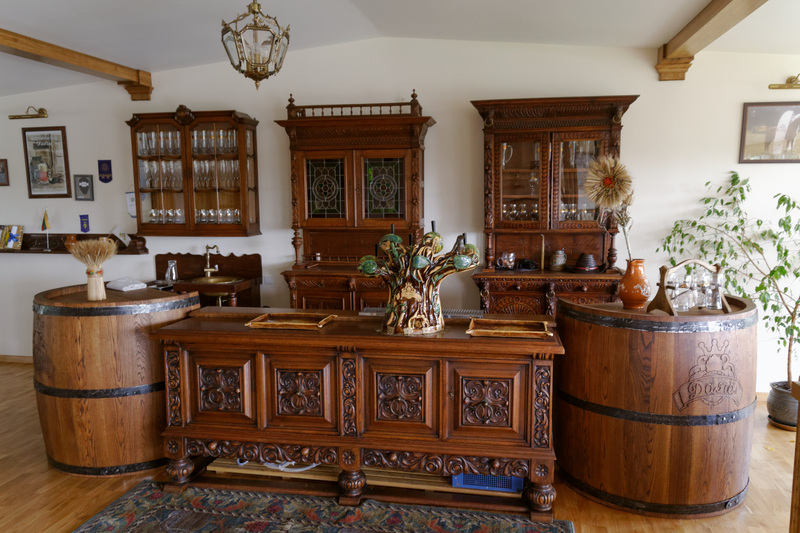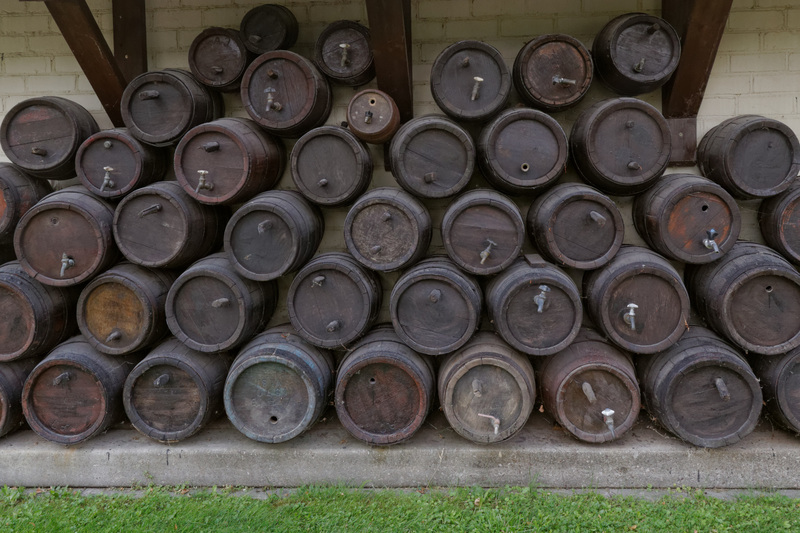Davra

The brewkit |
About a kilometer from Jovaru Alus, in Pakruojis itself, lies another brewery, called Davra. The moment we pull into the brewery yard I see that this is something else entirely. We're looking at a modern brewery building, not a barn, and clearly much larger than the farmhouse breweries we've been visiting. We're met by two men, probably father and son, in modern business suits. These are the owners, ready to take us on a tour of the brewery. (This is part 6 of the Lithuanian brewery tour 2015.)
The brewery looks like any small, modern brewery. Whirlpool, lautering tun, mashtun and boiler, and so on. They're quite small, though, for what is a very large facility. The fermentation room has row upon row of modern sylindro-conical fermenters, and it's cold! Because this is a lager brewery. The maturation halls are also big, and cold.
I ask them about the size of the brewkit, and it turns out it's just 2000 liters. But a batch is brewed every day, which is why there are so many fermenters and maturation tanks. The owners, however, don't work in the brewery any more. Vidmantas explains that they run many other local businesses as well. "But the brewery came first." That figures, because they really do look more like businessmen than brewers.

The tasting room bar |
We leave the brewery, and go into the next building, a modern tasting hall, gorgeously done out in white plaster and dark, shiny wood. We sit down at a table, and they serve me their pale lager, "Daujotu". It looks like any pale lager, but it sure doesn't smell that way. The aroma is odd, with earthy, toasty, herbal notes. The taste is grainy toast with a long dusty strawy earthy finish. The mouthfeel is light and fresh, making it a very easy-drinking beer, even there's though a lot of flavour. An excellent lager, even if very unusual.
Having been to Lithuania many times I recognize the flavour: it's the flavour of Lithuanian malts. And sure enough, in the brewery I'd seen large stacks of pilsner malts from the Viking Malt plant in Panevežys. In fact, if you want to practice recognizing the flavour of Lithuanian malts, Daujotu is an excellent place to start.
The brewery is most famous for their dark beer, however: Varniuku. It's a very complex and subtle beer, and I personally consider it a Lithuanian classic, even if it is a lager beer. That, too, uses Lithuanian malts, but while we were in the brewery they told me there was another ingredient, and took some out of a bag to let me taste. It looked like brown sugar, but tasting it it wasn't sweet at all. I looked at them in confusion, saying "this is sugar?" They laughed, and explained that it's caramelized rye. So part of the secret of the unusual and complex flavours of Varniuku are probably in the caramelized rye.

Vidmantas and the owners |
I ask them how they got into brewing, and it turns out their family moved here from Samogitia, further west in Lithuania. In that part of the country the brewing had died out, so they learned brewing from the locals after moving here. Then, in the early 90s, communism ended, and they saw an opportunity to start a brewery, because, they say, "the locals wanted beer." So Davra was started in 1993.
In the beginning they were making farmhouse ale, like everybody else, and brewing in wood, like everybody else. Indeed, the brewery still has the old wooden gear on exhibition here and there. There's a strainer next to the entrance to the brewery, and I take a close look at it. It looks exactly like the ones I've seen drawings of in descriptions of Danish farmhouse brewing, complete with the hole in the bottom, off to one side.
They used to use straw and alder sticks as filters in the strainer, and say this added a special flavour to the beer. I don't doubt that it did, because many accounts of Norwegian farmhouse brewing say the alder sticks added dark colour to the beer. I wish they'd gone on doing that, because I've never had a beer filtered through alder sticks before. And these guys are good brewers, so I bet the beer was excellent.

Stack of old beer kegs outside the brewery |
Evidently Davra was doing well, and in 2005 the owners decided to go the same route as the big boys, investing to turn their farmhouse brewery into a modern lager brewery. Soon after they launched Varniuku, and it proved wildly successful. In fact, a couple of years ago it made up more than 60% of their production. Having the dark beer be the most successful is quite unusual for a lager brewery.
The difference between Davra and the farmhouse brewers like Jovaru, Su Puta, and Piniavos is quite striking. They all make good beer, but the farmhouse brewers very clearly see themselves as keepers of the tradition, people whose task it is to keep a part of Lithuanian culture alive. The Davra brewers, however, clearly are businessmen, and not guardians of the cultural heritage. Perhaps it's different for them, since they moved here as outsiders, and the brewing for them isn't tied to the memory of father, grandfather, great-grandfather, and so on. I'd feel more confident about the future of the farmhouse brewing, however, if the traditionalists were as skilled on the business side as these guys clearly are.
Similar posts
Kupiškio - underground brewers
Eventually we ran out of breweries to visit in Pakruojis, and started discussing where to go next
Read | 2016-09-11 13:41
Vilnius: a beer guide for the impatient
My guidebook to Lithuanian beer has all the detailed information, but for those who are going to Vilnius and don't want to read 100 pages of detailed text, there isn't anything available now
Read | 2015-03-04 15:26
Apynys and Apynys
Until recently, the city of Kaunas in Lithuania was home to three breweries all named Apynys
Read | 2016-05-01 18:11
Comments
Mika Laitinen - 2016-08-30 00:54:35
Nice text Lars! It is a pity that I didn't run into Davra beers in July in Vilnius.
I wonder have those kegs been used by Davra?
Lars Marius Garshol - 2016-08-30 02:50:04
@Mika: There's always Davra available in Vilnius, although usually the Varniuku on draft dominates. But a weekend in Vilnius isn't enough to try all the interesting stuff, not by a long way. So you may have to go back. :)
They were very clear that they'd used those kegs earlier. I think the kegs that had been turned into doghouses at Jovaru had also been used. Aldona Udriene actually still uses a wooden keg to serve beer from to some guests.